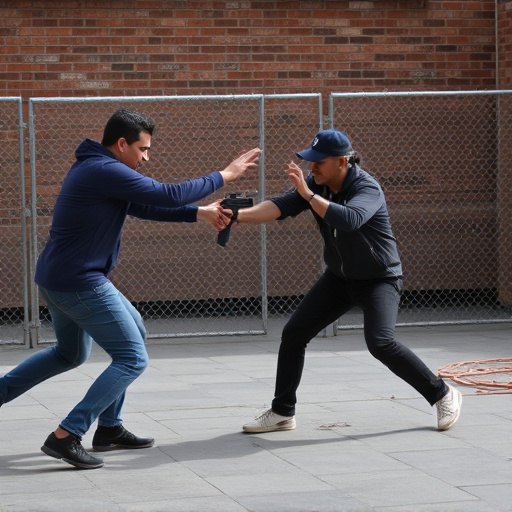US civilian Taser ownership laws vary greatly state-to-state, creating complexity for buyers seeking powerful legal stun weapons. Age restrictions, background checks, training, permits, and carry rules differ widely. Understanding legal frameworks is crucial to ensure compliance with state and local regulations, especially when considering self-defense or high-crime areas. Unlawful possession carries severe penalties, underscoring the need for awareness of state-specific laws regarding the most powerful legal stun weapons.
“Uncovering the complexities of civilian taser ownership, this comprehensive guide navigates the diverse state laws governing one of the most powerful legal stun weapons. From state-by-state regulations and age restrictions to permit types and exemptions, we demystify the legal frameworks surrounding these devices. Understand the penalties for unlawful possession and explore cross-border ownership rules, ensuring you’re informed about the legal aspects of taser acquisition. Dive into this essential resource for those seeking clarity on civilian taser ownership requirements.”
- State-by-State Regulations: Overview of Legal Frameworks
- Age Restrictions and Licensing Requirements for Tasers
- Permit Types: Who Needs One and How to Obtain It
- Exemption from Laws: Specific Situations and Cases
- Penalities for Unlawful Possession: Consequences and Fines
- Reciprocity of Laws: Cross-Border Ownership Rules
State-by-State Regulations: Overview of Legal Frameworks
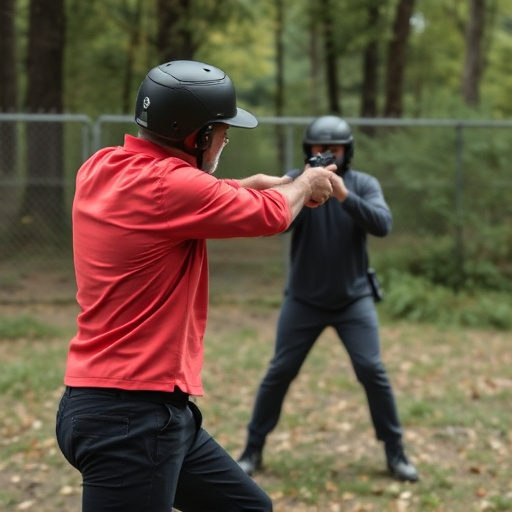
The regulations surrounding civilian ownership of Tasers, or stun guns, vary widely from state to state in the US, shaping the landscape for those seeking to arm themselves with what many consider among the most powerful legal stun weapons available. These laws range from stringent requirements that limit access to permissive frameworks that allow broader ownership and use.
Some states, like Texas and Florida, have relatively lenient regulations, allowing qualified individuals to carry Tasers without a permit. Conversely, other states demand thorough background checks, mandatory training courses, and permits for civilian possession. This patchwork of laws underscores the complexity of navigating one’s rights when considering owning what many view as powerful personal defense tools.
Age Restrictions and Licensing Requirements for Tasers
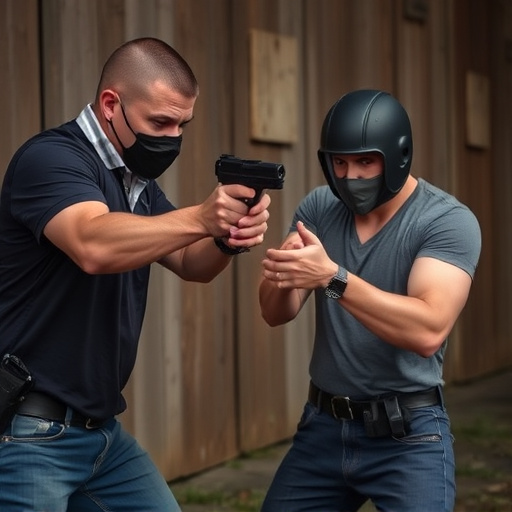
In many states, there are strict age and licensing requirements for civilians looking to own a taser, one of the most powerful legal stun weapons available. The minimum age varies, but it typically starts at 21 years old, reflecting the belief that younger individuals might not possess the maturity or responsibility to handle such devices safely. To obtain a taser, individuals must often undergo a background check and may be required to complete a safety training course specific to stun gun usage.
Licensing requirements for tasers differ across states. Some states do not require any license to own a taser for personal protection, while others mandate a concealed carry permit or even a permit specifically for stun guns. These licenses usually come with additional regulations regarding where and how the device can be carried, highlighting the ongoing debate around civilian access to such powerful legal stun weapons.
Permit Types: Who Needs One and How to Obtain It

In many states, civilian ownership of a Taser is regulated, requiring individuals to obtain a permit before purchasing and carrying one. These permits are typically categorized into two types: concealed carry permits (CCW) and open carry permits. CCW permits allow individuals to carry their most powerful legal stun weapons in public areas while keeping them hidden from view, providing an extra layer of discretion. Obtaining a CCW permit usually involves completing a background check, passing a safety course, and meeting specific residency requirements. The process can vary by state, so prospective owners should consult local law enforcement or relevant government agencies for detailed instructions.
On the other hand, open carry permits enable individuals to display their stun weapons in plain sight, often with fewer restrictions on where and when they can be carried. However, even with an open carry permit, there are usually rules about specific locations like schools, courthouses, or airports where carrying a stun gun is prohibited. It’s crucial for prospective Taser owners to thoroughly understand the legal framework surrounding their right to carry, ensuring compliance with both state and local regulations regarding these powerful legal stun weapons.
Exemption from Laws: Specific Situations and Cases

In many jurisdictions, laws regarding civilian tasers are stringent, reflecting concerns about their misuse and potential for harm. However, certain situations and cases may exempt individuals from these restrictions, providing access to what are considered some of the most powerful legal stun weapons available. For instance, individuals facing imminent physical threats or those protecting property in high-crime areas might rely on such exemptions.
These exemptions often arise from specific legal precedents or policy interpretations that recognize the necessity of self-defense or property protection. While laws vary widely across states, some common scenarios include situations where the use of force is justified to prevent serious bodily harm or property damage. In these cases, individuals may legally employ tasers as a non-lethal but powerful deterrent or response mechanism, ensuring they remain within the boundaries set by state law for civilian ownership and usage.
Penalities for Unlawful Possession: Consequences and Fines
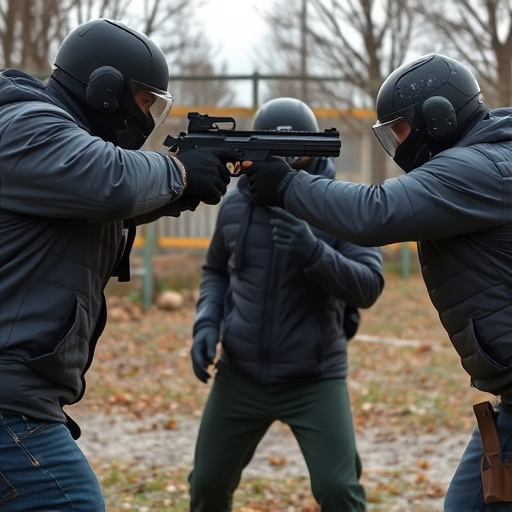
In many states, the penalties for possessing a taser without proper authorization are severe. These penalties often include substantial fines and potential jail time. The exact consequences vary widely from state to state, with some jurisdictions imposing stricter punishments than others. For instance, in states where tasers are classified as most powerful legal stun weapons, unlawful possession can lead to charges of misdemeanor or even felony, depending on the circumstances. Fines can range from several hundred dollars up to thousands, and individuals may face additional penalties such as probation, community service, or mandatory safety courses.
Law enforcement agencies take the unauthorized possession of tasers very seriously due to their potential for misuse and the risk they pose to public safety. Individuals caught with these powerful legal stun weapons without proper training or certification can expect to face the full weight of the law. This strict enforcement serves as a deterrent, aiming to keep these devices out of the hands of untrained individuals who might use them recklessly.
Reciprocity of Laws: Cross-Border Ownership Rules
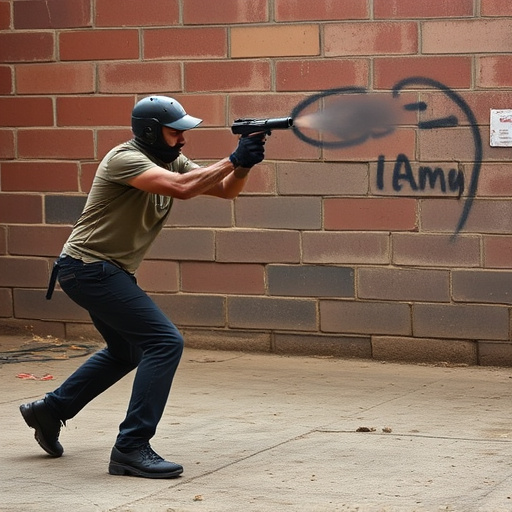
When considering civilian taser ownership, it’s crucial to understand that state laws regarding stun weapons vary significantly across borders. This reciprocity of laws is a critical aspect for individuals looking to purchase and own tasers legally. Cross-border travel can present challenges as strict regulations in one state may not align with another’s, making it a complex landscape for prospective taser owners.
For instance, some states consider tasers as most powerful legal stun weapons, enforcing stringent requirements on ownership and carry permissions. Conversely, neighboring states might have more lenient rules, allowing easier access to these devices. Travelers or residents moving between such jurisdictions must navigate these differences to ensure compliance with local laws, avoiding any legal complications that may arise from unintended breaches in regulations.
Understanding the diverse civilian taser ownership requirements under state laws is crucial for those interested in purchasing these most powerful legal stun weapons. From age restrictions and licensing to permit types and exemptions, each state has its own framework governing access to tasers. Navigating these regulations is essential to ensure compliance and safety when possessing these devices. Additionally, being aware of potential penalties for unlawful possession can help users avoid legal pitfalls. As the landscape of self-defense continues to evolve, staying informed about your rights and responsibilities under local laws is paramount.
